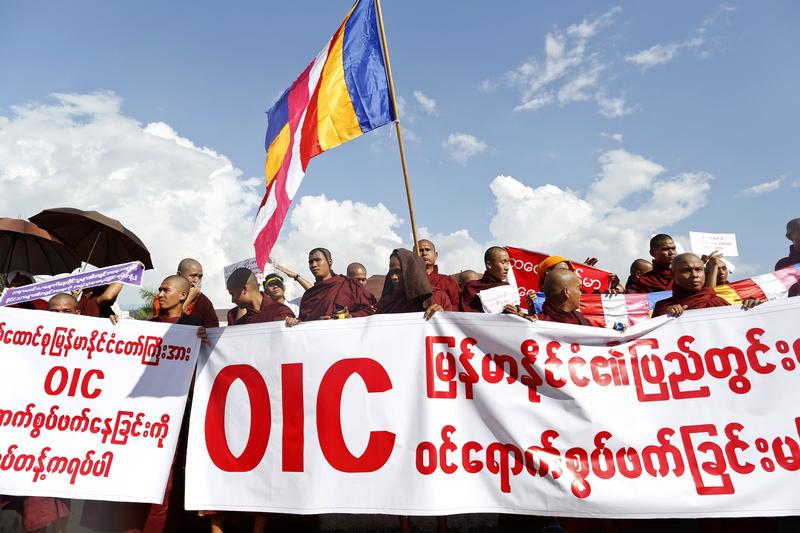Burma’s perennially contentious relationship with the Organisation of Islamic Cooperation (OIC) moved no closer toward amicability this week as the two sides traded barbs over the situation in Rakhine State, where a mass exodus of Rohingya Muslims tied to allegations of ethnic cleansing has heaped global censure on the Burmese government.
The OIC, a grouping of 57 Muslim-majority nations, released a statement on Sunday that criticised what it described as “recent systematic brutal acts perpetrated by security forces against the Rohingya Muslim Community in Myanmar that has reached the level of ethnic cleansing, which constitute a serious and blatant violation of international law.”
The statement followed the 45th session of the OIC’s Council of Foreign Ministers held in Dhaka, the capital of Bangladesh, which at its southeastern tip is hosting more than 600,000 Rohingya refugees who have fled Burma since August.
It did not take long for Burma’s Ministry of Foreign Affairs to fire back. In a press release published in the state-run Global New Light of Myanmar newspaper on Thursday, the ministry said the Dhaka Declaration “lacks balance and fairness.”
The statement pointed to the failure of the declaration to acknowledge Aug. 25 attacks by the Arakan Rohingya Salvation Army that prompted the crackdown, and explicitly rejected its use of the terms “ethnic cleansing” and “State backed violence” to describe the crisis in Rakhine.
“The [Burmese] Government has stated time and again that no violation of human rights will be condoned,” the statement said, rightly noting an oft-repeated denial in the face of a large body of research that suggests security forces were guilty of grave misconduct in their counterinsurgency campaign.
“Allegations supported by evidence will be investigated and action taken in accordance with the law,” it continued.
The government’s approach to inquiries into alleged human rights violations in Rakhine State has had a decidedly “in-house” bent: An international fact-finding mission commissioned in March 2017 has been denied access to the country and, as of December, UN Special Rapporteur on Human Rights in Burma Yanghee Lee has likewise been barred. Multiple investigations by the Burmese military, meanwhile, have led to accountability measures in only a handful of cases.
Existing enmity
Since violence flared in 2012 between Rakhine State’s Buddhist and Muslim communities, the Burma-OIC dynamic has become increasingly fraught.
The Muslim bloc has been a frequent critic of Burma’s treatment of the Rohingya, raising its concerns not just at member forums such as its weekend conclave of foreign ministers, but also at the UN Human Rights Council, where it holds about one-third of seats.
Buddhist nationalists in Burma have often responded in kind, such as in November 2013, when hundreds took to the streets of Yangon and Mandalay to protest the visit of an OIC delegation.
The Burmese Foreign Ministry’s statement was incongruous on at least one point, asserting “the immediate need for the repatriation of displaced persons from Rakhine,” while also pledging its support for the “voluntary, safe and dignified return of the displaced persons.” Many across the border have expressed concerns for their safety, and as a result it appears that voluntary repats are few in number to date.
[related]
The OIC has not been alone in its condemnation of what has unfolded in Rakhine State. The United States, Britain and Malaysia — an OIC member but like Burma also part of ASEAN, a regional grouping notorious for its “noninterference” doctrine — have all harshly criticised what has variously been described as ethnic cleansing, crimes against humanity and genocide in Rakhine.
Additionally, this week the UN Security Council called for “transparent investigations into allegations of human rights abuses and violations, [urging] the government of Myanmar to fulfill, based on respect for the rule of law, its stated commitment to holding accountable perpetrators of violence, including sexual violence and abuse and violence against children.”



